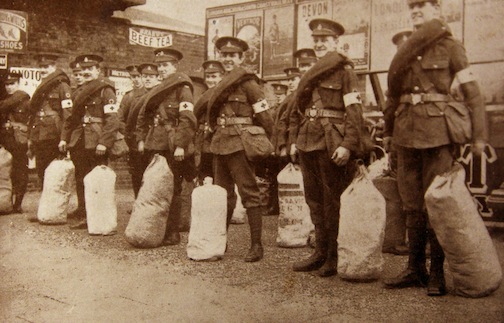
“All Is Calm” Celebrates Peace in Wartime
One week before Christmas in 1914, a mere five months after the outbreak of the First World War, English Tommy and German Jerry met on the muddy fields of No Man’s Land to shake hands. The troops in the trenches stopped fighting and settled down to sing carols and exchange gifts of tobacco, rum and chocolates with the enemy.
This moving and revelatory moment in the war was celebrated by the singing group Cantus this past Friday at First Congregational Church in Berkeley as part of Cal Performances’ chamber music series. The Minnesota–based men’s a cappella group was joined by three actors from Minnesota’s Theatre Latté Da, who recited letters, speeches and other records from the time.
The songs were beautifully sung, and especially moving because they were performed by men who were of the same age as the soldiers fighting in the trenches, the men who gathered together to sing that first December of the war.
The idea for All Is Calm: The Christmas Truce of 1914 belongs to Theatre Latté Da Artistic Director Peter Rothstein, who approached the singing group, suggesting the collaboration. Rothstein, aware of the importance of radio during the conflict, opted to create a “radio musical drama” – a performance piece for music and voice.
The music, arranged by Erick Lichte and Timothy Takach, spins a narrative through a wide range of songs. The piece began with a prologue of Christmas songs, then moved to optimistic and patriotic songs, such as “Alexander’s Ragtime Band” and “God Save the King.” The mood shifted to melancholic with songs such as “Pack Up Your Troubles” and “Keep the Homefires Burning”. And continued to the songs that were most likely sung that cold day of the war, the jovial “We Wish You a Merry Christmas” and the sweetly triumphant “Angels We Have Heard on High,” alongside German and French songs. The tender festivities ended with “Auld Lang Syne,” the song that was in fact sung by all the soldiers in unison that Christmas 1914.
Many of these songs, carefully and intelligently arranged to provide a variety of musical textures – some solos, some trios, some the entire nine-man ensemble – were often the background to spoken texts. These short selections were written by all levels of the population, from Private Tom Macdonald of the Royal Sussex Regiment and Hugo Klemm of the 133rd Saxon Regiment to Winston Churchill and Pope Benedict XV.
Some 37 million military and civilian casualties – over 16 million deaths and 20 million wounded – had died by the time the war ended on November 11, 1918. The Great War was one of the deadliest in human history. But at the moment of the Christmas Truces, the British population still believed the soldiers would be home by Christmas.
Although the December 1914 Christmas Truces are seen as part of trench behavior during this bloody conflict, they are now recognized as the most dramatic example of non-cooperation with the organized war effort. The fact that they were successful lapses in the combat and were continued in some form throughout the war, despite the indignation of the commanding officers who forbade “unauthorized intercourse with the enemy,” begs the question of war altogether.
As one of the soldier’s commented, “Could it have ended?” Right then? With just the spontaneous outreaching of young men, who stopped to rest, to sing, to play and to bury their dead? Why not?
One of the soldiers remarked that he had felt shamed by the fact that the truce was broken by a British soldier who shot a solitary German left in No Man’s Land. The lines of the trenches are still visible on the landscape of Europe, and thousands of unmarked graves fill the landscape.
– Jaime Robles
